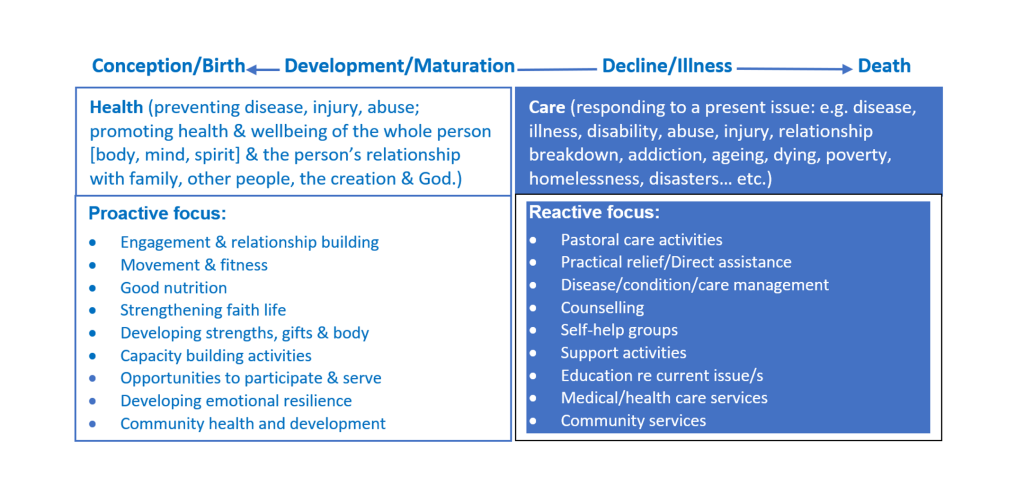Health & Pastoral Care Ministry
The church has a vital role to play in health, healing and compassionate care provision.
God commands that we “love our neighbour” (Mark 12:30-31) and when we do “love one another” it is a powerful witness of God’s love and grace to the world we live in (John 13:35).
The church is commanded by Christ to “preach the kingdom of God and to heal the sick” (Luke 9:2). Healing activities made up a large part of Jesus’ ministry. He healed people from various conditions and that healing was physical, mental and spiritual in nature (Matthew 15:30), enabling people to be restored to their community, to resume their roles within family/community, thus glorifying God and achieving their potential. Jesus instructed his disciples to continue that healing work (John 14:12) and as his disciples today the Church continues to exercise this ministry in Jesus’ name.
Health and Pastoral Care Ministry is a contemporary expression of the Christian church’s vital diaconate ministry. Historically, the early church had deacons/deaconesses who provided aid and comfort as a service ministry and the vocation of modern nursing has its roots in this tradition. [1,2]
More than pastoral care
People in churches may view health ministry as synonymous with pastoral care of ill, injured, bereaved, or distressed people. Pastoral care provides the church’s reactive responses that support the person in a time of acute need or crisis.
Health and Pastoral Care Ministry is much more than that. It takes a whole-of-life approach to promoting the health and wellbeing of individuals, families and communities across the continuum of life from birth to death.
Underpinned by biblical principles
Health and Pastoral Care Ministry (HCM) is underpinned by biblical principles of Christian living which encourage us to ‘love one another’, live justly, exercise good stewardship, live in communion, empower one another to grow and develop our full potential, and nurture and disciple one another so we grow toward wholeness in and through Jesus Christ. In this way individuals and the whole faith community extend Christ’s love to people within the church, within the local community and across the whole world.
The two foci of Health and Pastoral Care Ministry: Health and Care
Health
Health is more than the absence of disease. It is better described as ‘a dynamic state of wellbeing’ resulting from harmony between a person’s body, mind and spirit; and their ability to adapt to, and live in harmony with, other people, the creation, and with God. Illness occurs when there is disruption in any of these relationships. [3]
The Biblical concept of health is summarised in the word ‘Shalom’ which scripture describes as physical and psychological wellbeing that include just and right relationships between people and nations, which are the product of integrity and ethical living that results in people experiencing peace, wholeness, health and a sense of wellbeing.
The Health focus is a proactive approach that seeks to prevent injury, abuse and illness by focusing attention on the pre-conditions that promote holistic health. Such ‘Health’ promoting activities occur within Christian faith communities in many and varied ways that inform the continuum of life from conception, birth, development and maturation, through to decline, illness and death.
Health ministry seeks to facilitate ‘shalom’, promoting wholeness, preventing disease, injury and abuse, enabling coping, nurturing faith, igniting hope, demonstrating love, expediting healing, and cultivating relationships within the person (body, mind and spirit), between the person and others, between the person and the creation, and between the person and God.
Care
The ‘Care’ focus of HCM includes reactive activities the Christian faith community undertakes to restore health and wellbeing. Care activities are targeted to the actual needs of the person, families and communities, and are aimed at bringing hope, providing support and compassionate care, and providing restoration, nurturing faith and encouraging healing.
These activities are intentional responses that identify and assess needs within your community and seek to meet them. The intended outcomes are to foster personal wellbeing, healthy relationships, compassionate support, transformational growth and healing.
Health and care across the continuum of life
Together the two foci of health and care provide a balanced, holistic ministry that does not wait for a problem to occur in order to respond with Christs’ love. Rather, it takes an approach that seeks to empower people to discover God’s gifts within themselves to prevent suffering as well as alleviating it when problems arise.
HCM is a Christian response to living a just and righteous life (Micah 6:8). The responses focus on the whole person in relationship with the creation, the creator, and other people, across the continuum of life from conception and birth through to death. The types of activities undertaken are tabled below.

Click here to download this information
Going deeper
To read more on this subject:
- Engaging the faith community in promoting community health
- A Bible study on serving in health ministry to promote health
- Genuine friendship promotes hope and health
- Faith and healing – what does God’s word say
Learn more by becoming a member or a subscriber. Membership provides additional benefits at a low costs and support the work of AFCNA in making resources available.
References
- MP Donahue, Nursing the finest art: An illustrated history, Mosby, St Louis, 1985.
- JE Olson, One ministry, many roles: Deacons and Deaconesses throughout the centuries. Concordia, St Louis, 1992.
- A van Loon, Developing a Model of Faith Community Nursing in the Australian Context, Unpublished doctoral dissertation, Flinders University, Adelaide, 2000.
This information was developed from the doctoral dissertation of Antonia van Loon, founder of the Australian Faith Community Nurses Association and is used with her permission.
AFCNA invites you to be part of God's work in the world!
As a valued partner you will support AFCNA to engage, nurture, equip and network Christian people to provide compassionate and hopeful Faith Community Care and Faith Community Nursing.
